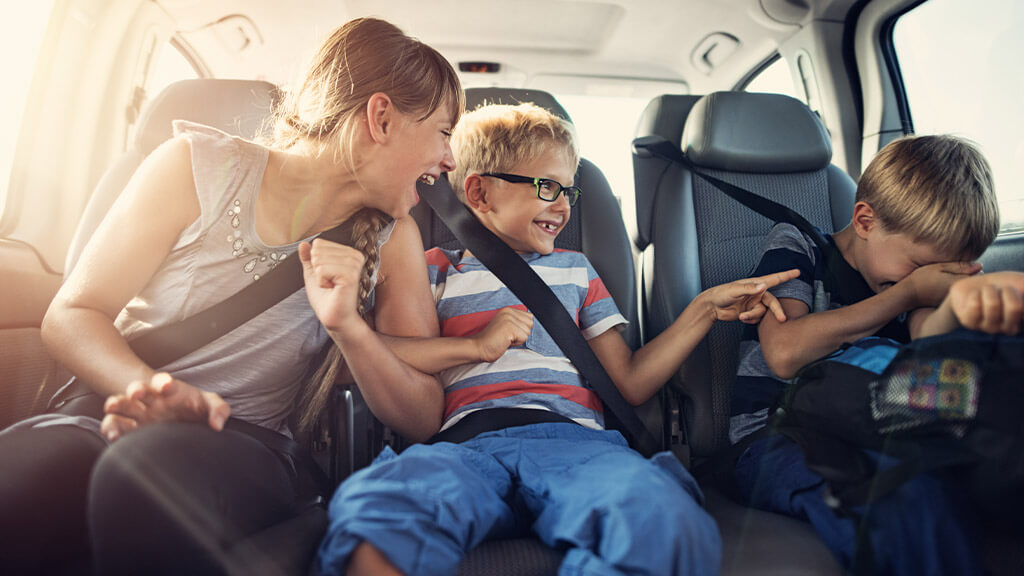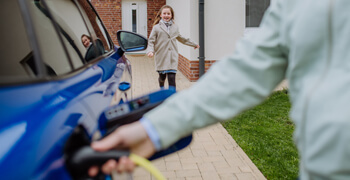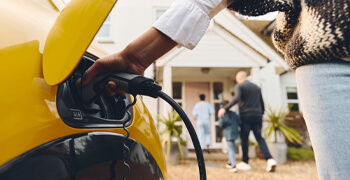Home > Blog > Mobility > How to take the stress out of travelling with the kids this summer
How to take the stress out of travelling with the kids this summer
Goodbye school, goodbye colleagues, it’s finally time to take the whole family on holiday! Are you dreading a car journey with the constant stream of “I need a wee”, “I’m bored” and “Are we nearly there yet”? Here are some tips for stress-free travel with your offspring.

Drivers in top form
First of all, you need to be in top form to have an enjoyable journey with your children. Take care of yourself because your mood – good or bad – will very quickly rub off on the whole family.
Plan ahead as much as possible to put your mind at ease: good car insurance, prepare a luggage checklist, plan your route, book the accommodation and get any Covid documents sorted out. A few days before you leave, remember to do a maintenance check of your vehicle, including tyre pressure, the oil level and the car seat adjustments and connectors.
If you have a garage, load up your car the day before you leave. This gives you the chance to take care of anything you may have forgotten. Most importantly, it saves time and takes the pressure off on the day of the journey.
Make your journey fun and comfortable. Download some gripping podcasts and have plenty of your favourite snacks at hand. If your car is heavily loaded, get a roof box or trailer to make more room in the passenger compartment. It will be more comfortable and safer.
It’s hard to tell if there will be traffic jams or detours: bring plenty of water and a bite to eat. Keep a spare outfit handy for each child, in case they spill their apple juice or have any other accidents. A stock of paper towels or tissues will certainly come in handy, too.
On holiday as soon as you set off
Even though you are in a hurry to get there, the miles stretch out before you, so you might as well make the most of them.
If you’re feeling all right, you can set off really early, at around 4 or 5 a.m. The roads are still clear and there’s a good chance your children will go back to sleep, which is good for them and for you.
Prepare your children and explain to them in advance what will happen on your journey. They don’t have the same sense of time and distance as adults do: show them the route on a map and compare the journey with trips they already know. Soon you’ll get the classic “Are we there yet?”. It is best to be very clear from the outset: “The journey will take all day (or half a day, depending on your destination), you’ll have to be patient, you’re going to keep yourselves quietly busy and when we arrive, we’ll be in a wonderful place for a lovely holiday”. If you just answer “Soon” or “In 2 hours”, the question about if you’re there yet is likely to come up again very soon, and over and over again.
Take your time. To keep the driver alert and stop your children getting restless, plan to stop for 15 to 30 minutes every 2 hours. Chooses places that are suitable for playing and running around, such as a restaurant or motorway service area with play equipment, or a wood or meadow near a motorway exit. Children will be calmer in the car if they have had time to let off steam.
In addition, if you want to take your time, why not plan a stopover? It’s an opportunity to make the most of the journey and sleep in an unusual place, have a nice meal or discover a new region! The journey takes longer, but the holiday starts sooner. Parents are more relaxed, the children have fun and it’s a win-win situation.
Boredom: your worst enemy
Take advantage of being together to play together. You can all count the yellow cars, invent guessing games (“Who am I?”, “What animal am I imitating?”), play the “Yes/No” game, sing, etc.
You can also listen to stories, either together or on your own. There are more and more podcasts for children, such as “Les odyssées” (France Inter), which takes 7-12 year olds through the great legends of history, or “La grande histoire de Pomme d’Api” for 3-6 year olds with stories told by parents.
If your child does not suffer from motion sickness, they can immerse themselves in books. Non-fiction books or “seek-and-find” books can be poured over for ages, without the need for an adult to read.
Also bring some small toys. Ask each child to fill a small bag with their favourite figurines or toy cars. Or give them a surprise, for example notebooks with stickers.
Be strategic with snacks:
- stay in charge of these goodies so that you can hand them out fairly
- take them out as a last resort, when the kids are becoming restless during the last few miles
- If possible, avoid sugar, a stimulant that can quickly make things a little too lively in the car.


